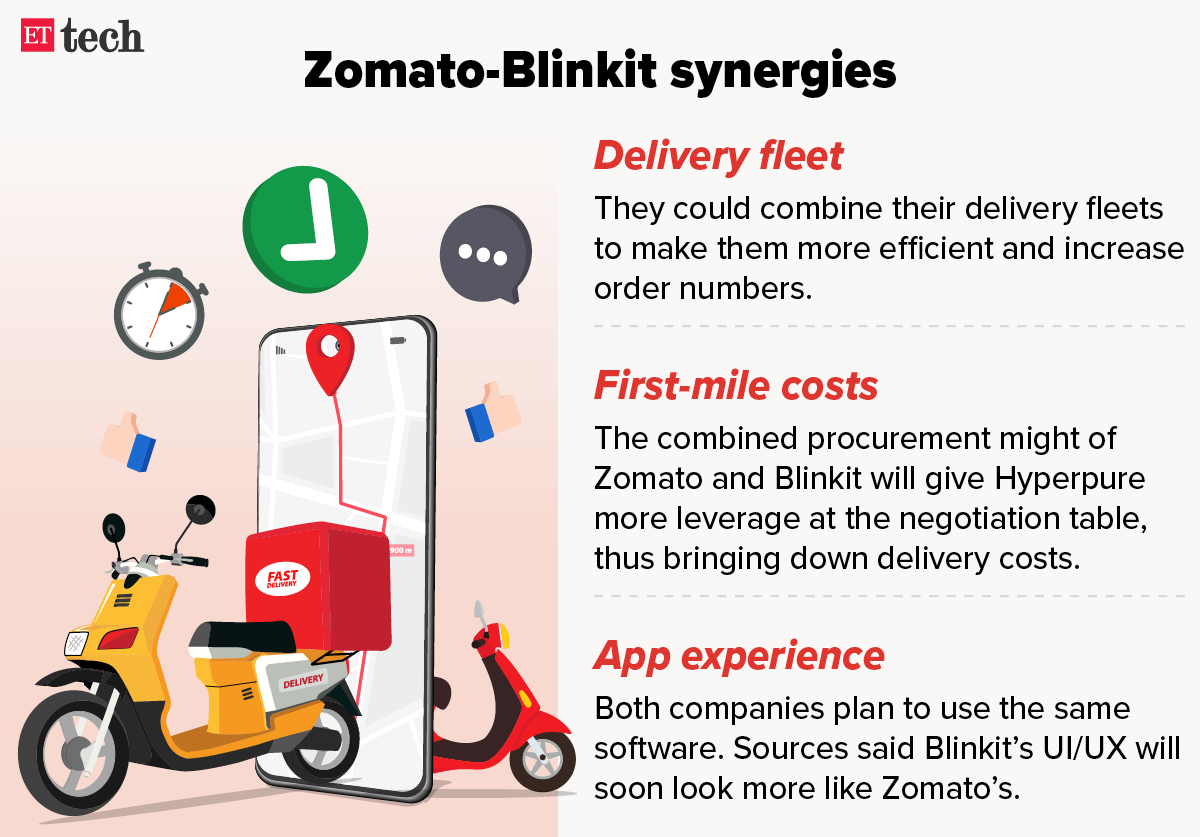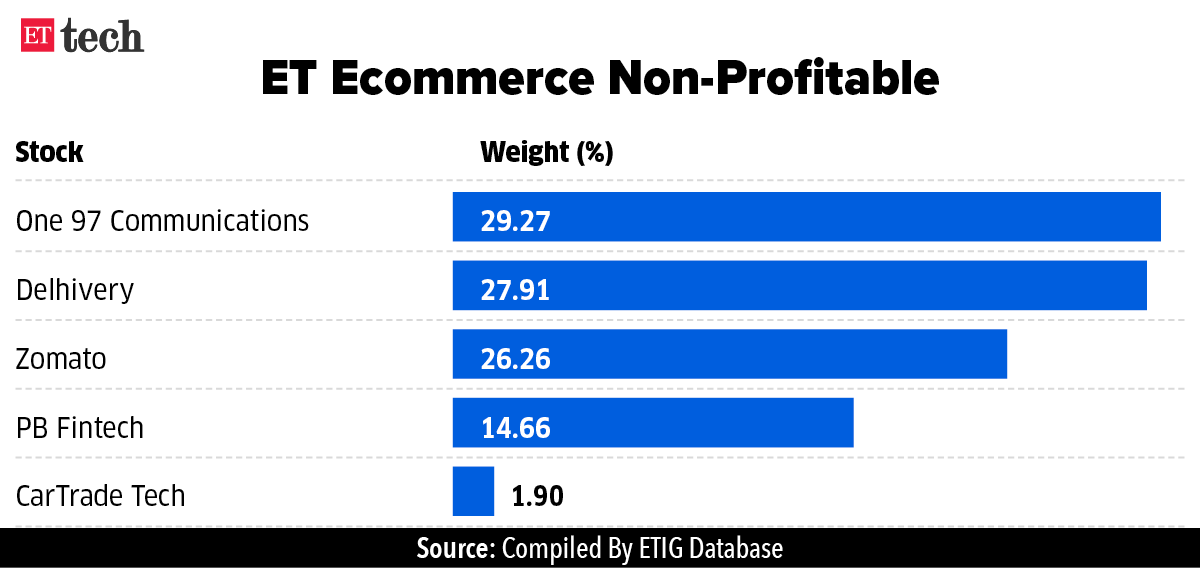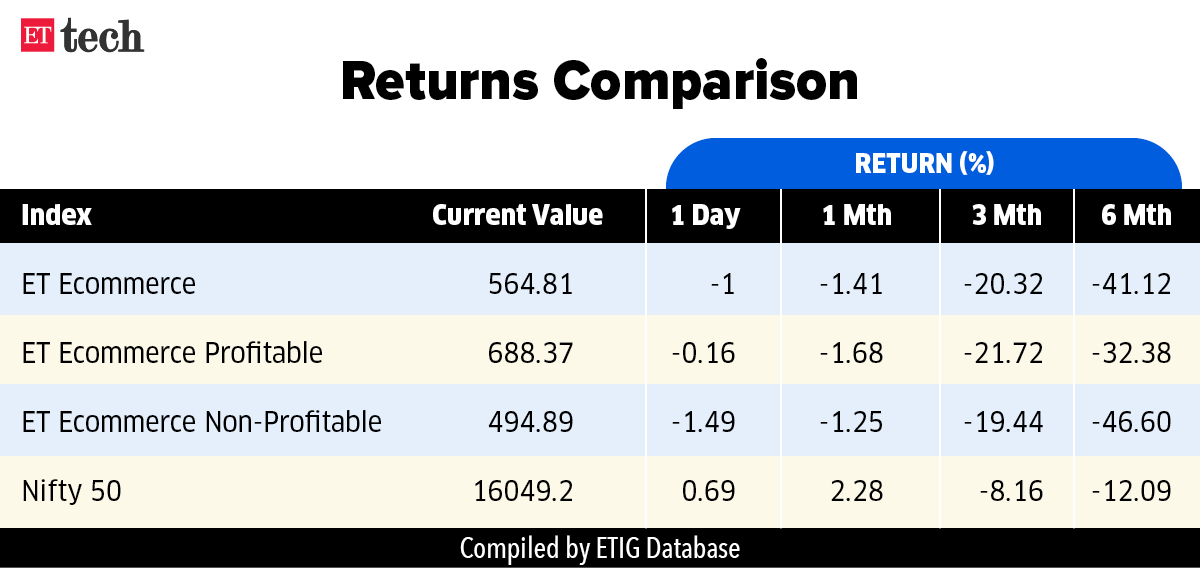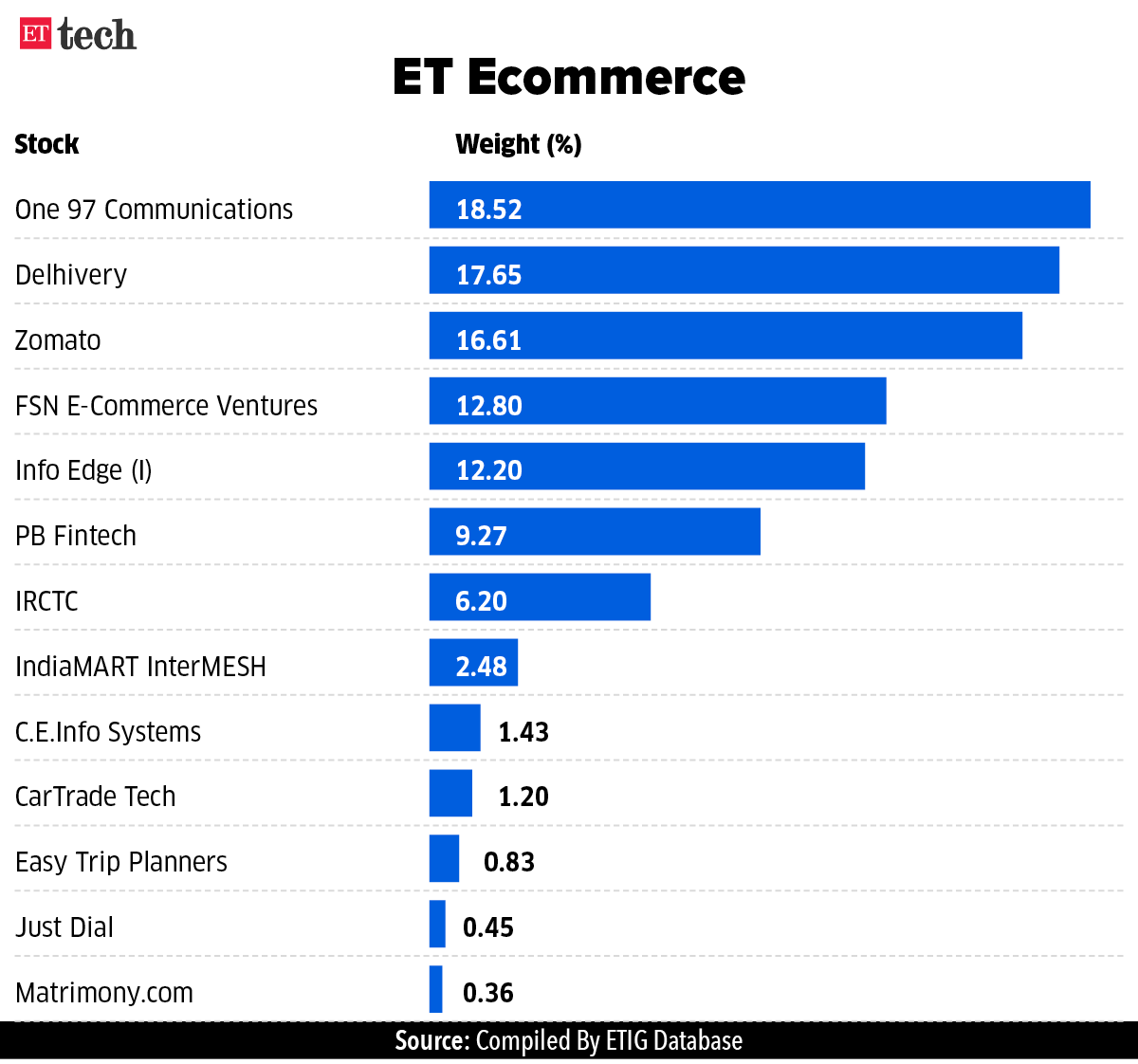ET Ecommerce Index is here! We’re excited to announce that starting today, ETtech Morning Dispatch will feature a daily chart of three indices we launched to track the performance of recently listed tech firms – ET Ecommerce, ET Ecommerce Profitable, and ET Ecommerce Non-Profitable. Read on to find out which companies comprise the three indices and how they’ve fared so far.
Also in this letter:
■ Slice fundraising on hold as RBI note triggers uncertainty
■ Crypto firms plan new industry body as BACC shuts
■ Demand for original content far exceeds supply: SonyLIV’s Danish Khan
Blinkit to integrate with Zomato Hyperpure in fresh pivot
Blinkit is shutting down warehouses again, this time to integrate its operations with food delivery major Zomato, which is in the process of acquiring the Gurgaon-based quick commerce startup.
Blinkit is expected to shut most of its own backend fulfilment warehouses and merge them with Zomato’s business-to-business restaurant supply business Hyperpure, two sources told us.
In March, the company had halted its business and shut many dark stores, only to open new ones so that it could keep its 10-minute delivery promise.
The move was seen as an attempt to better compete with Mumbai-based Zepto, which at that time was aggressively promoting 10-minute delivery.
Layoff fears: This time, though, there is an air of uncertainty for employees as a number of Blinkit employees are being transferred to Zomato Hyperpure.
“There are likely to be layoffs in any M&A deal and even though the company has not said anything about layoffs, duplications are likely to emerge,” said an employee.
Vertical integration: While both companies have spoken a lot about using the same delivery fleet, the immediate priority is to integrate the backend, our sources said.

“This helps reduce costs significantly for Blinkit as the joint entity can not only bring down the procurement costs due to economies of scale but also share resources like backend fleet and manpower,” one of them said.
Dark times: Blinkit’s integrating with Hyperpure is significant as big-spending quick commerce companies are currently cutting costs amid a funding slowdown.
We reported on June 7 that companies have stopped promising 10-minute delivery and are trying various ways to cut costs such as clubbing multiple orders.
ET Ecommerce Index: Frothy valuations catch up with startups

New-age ecommerce companies are going through a challenging period with a rise in the cost of capital and a crash in valuations. The tech-heavy Nasdaq index has declined 28% so far this year, while the NYSE FANG+ index has plunged 33% since January 1.
The situation is no different in India.
The ET Ecommerce index has fallen 44% this year compared to a 7.5% drop in the Nifty 50 index. The ET Ecommerce Profitable index has outperformed the other two over six months, with 31% negative returns, compared to the 51% plunge by the ET Ecommerce Non-Profitable index and an about 44% fall in the main index.
The Economic Times launched the three indices – ET Ecommerce, ET Ecommerce Profitable, and ET Ecommerce Non-Profitable – to track the performance of recently listed new-age technology companies. ET has compiled these three indices with non-promoter’s market capitalization, taking December 2021 as the base period.

Over three months, the ET Ecommerce Non-Profitable index has outperformed the profitable and main index.

Cartrade Tech, PB Fintech, Delhivery, Zomato, and One97 Communications have been included in the non-profitable index, and eight stocks – including Info Edge India, IRCTC, Indiamart, Easy Trip Planners, CE Info Systems, Just Dial, Matrimony.Com and FSN E-Commerce – are part of the profitable index.
The ET Ecommerce index includes all 13 stocks.

Stocks such as Zomato, One97 Communications, Cartrade Tech, and PB Fintech have declined between 60% and 70% from their yearly highs.
The excess liquidity has created a bubble, with many businesses lacking a path to profitability, but the current conditions will bring in a much-needed correction, analysts said.
“As the financial liquidity conditions are tightening, companies are prioritising margin improvement overgrowth,” said Vivek Maheshwari, analyst, Jefferies India.
“Fast-growing companies enjoyed higher valuations in the funding rounds, encouraging a faster cash burn. This virtuous cycle of growth and valuation has come to a pause now. The cost of funding is rising and will impact valuations,” Maheshwari added.
TWEET OF THE DAY
Slice fundraising on hold as RBI note triggers uncertainty

Fintech firm Slice’s ongoing fundraising has come to a halt after the Reserve Bank of India’s circular last month barred prepaid payment instruments (PPIs) from loading credit lines, sources told us.
By the numbers: They said the company’s funding round, of which $50 million was raised last month led by Tiger Global, is on hold now as stakeholders wait for clarity.
Slice was looking to add at least another $50 million to its latest round and was in talks with new and existing investors. The Bengaluru-based firm joined India’s unicorn club last November, after it picked up $220 million in a round led by Tiger Global and Insight Partners. It was valued at around $1.5 billion after the $50 million funding in June.
Uncertainty: The RBI communication had a huge bearing on fintech firms that were selling their credit-card proposition as a strong differentiator to investors and stakeholders.
“These card-based fintechs will find it very tough to now even raise internals, until the final regulatory scenario is clear. They were able to raise funds until they were calling themselves challenger cards to the legacy credit card – that was the pitch,” said a fintech investor, who didn’t want to be named.
Crypto firms plan new industry body as BACC shuts

Crypto exchanges and blockchain companies are trying to cobble together an independent industry body after the Internet and Mobile Association of India (IAMAI) dismantled the Blockchain and Crypto Assets Council (BACC) last week.
IAMAI’s surprise move brought to an end an affiliation in which both sides were increasingly taking divergent stances on key issues.
Industry insiders said preliminary talks are on between key stakeholders, but a new association will take time to form as key stakeholders are still to find common ground.
Differences: Differences between IAMAI and BACC had been simmering for many months. Crypto players felt IAMAI wasn’t doing enough to push their cause, while the industry body felt crypto players needed to do more in terms of compliance.
The crypto exchanges were told about the shutting down of BACC only after IAMAI had taken the decision, a crypto exchange executive said.
Demand for original content far exceeds supply: SonyLIV’s Danish Khan

SonyLIV, the video-streaming platform from Sony Pictures Networks India (SPN), is looking at investing heavily in original content – around 60 shows and 36 movies every year – across languages to fill the seemingly insatiable demand for content from users in India.
“I think the demand for original content far exceeds the supply that we have today. On average, all the major OTT players put together are not putting up more than 10 shows per month, which is around 100 hours of content,” Danish Khan, executive vice president and business head of SonyLIV told us.
“For a country as large and as diverse as ours, I think there’s a huge amount of potential for more content and variety of content.”
He confirmed that SonyLIV plans to release about 60 shows a year. “We will do around 18-20 series in Hindi and the rest will be in other languages, primarily Tamil, Telugu, Malayalam, Marathi, Bengali and Punjabi.
Zoho plans to hire 2,000 workers for Indian and global expansion

Software-as-a-service (SaaS) major Zoho Corp is looking to hire at least 2,000 employees across engineering, technology and product development as it looks to expand in India and around the world.
Zoho is looking to hire more software developers, quality assessment engineers, web developers, designers, product marketers, writers, technical support engineers and sales executives, Prashant Ganti, head of products, tax, accounting & payroll, Zoho, told us.
He said the company plans to grow organically and expand to other geographies. Zoho, which has a presence across India and the US, recently entered geographies such as Egypt, Jeddah and Cape Town.
The company is also working on tapping talent in rural India, Gati said. Its global headcount is presently around 10,800.
We reported on July 12 that Zoho has rural hubs in Tamil Nadu and is looking for locations in tier 3 and 4 towns in Uttar Pradesh to set up an office.
Other Top Stories By Our Reporters

Global startup funding fell 23% in Q2, says report: According to a recent report from CB Insights, global funding for startups fell 23% in the second quarter of 2022 from the first quarter, with $108.5 billion invested across 7,651 deals. This marked the biggest quarterly percentage drop in deals (and the second-largest drop in funding) in a decade, the report said.
Grameen e-store sees 100% revenue jump: The 2021-22 revenue of the CSC-run Grameen e-store, the government backed rural ecommerce venture, has jumped nearly 100% to Rs 581 crore compared to Rs 259 crore registered in the previous fiscal, according to sources.
Foxconn may set up skill building institute: Foxconn is mulling setting up a skill development centre in India, possibly similar to its Hon Hai Research Institute in Taiwan, as the contract manufacturing company is building an ecosystem to support expansion of its production base here, people aware of the plan told us.
Indian gig workers struggle with lack of social security: The government has introduced a comprehensive set of codes, subsuming 29 labour laws, under four broad categories – wages, industrial relations, social security and occupational safety. Delivery executives – dubbed platform workers – are covered under the code, which provides them with various social security options. But executing these codes is under the purview of state governments, as labour comes under the concurrent list of the Constitution.
Global Picks We Are Reading
■ Rappi mafia: How a delivery startup took over Colombia’s tech scene (Rest of world)
■ Elon Musk’s inner circle rocked by fight over his $230 billion fortune (WSJ)
■ Crypto world crosses fingers in hopes contagion has run its course (Bloomberg)
























